Nickel Diner, beloved by Jonathan Gold, Guy Fieri and others, to close this weekend
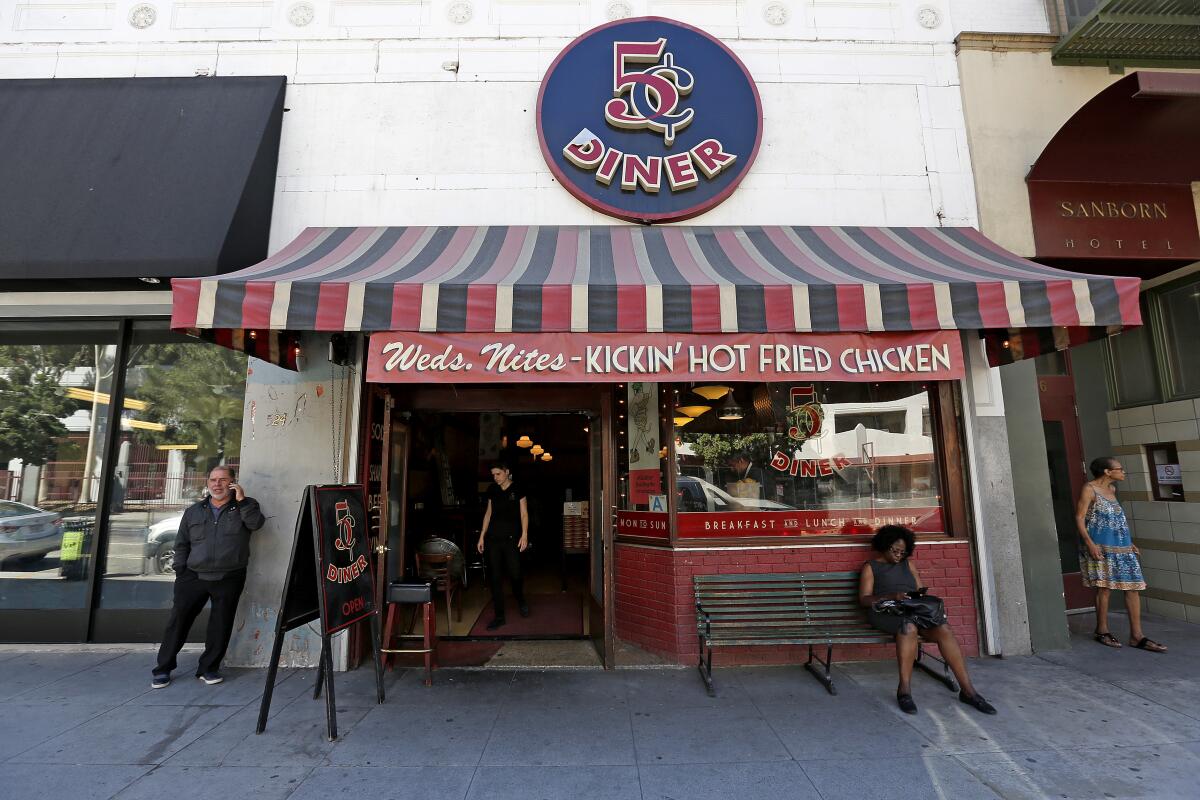
- Share via
Monica May and Kristen Trattner have served hundreds of strawberry pop tarts, plated countless huevos rancheros and freshly fried an onslaught of maple bacon doughnuts at their beloved Nickel Diner. On Sunday their restaurant, lauded by Jonathan Gold, Guy Fieri and many others, will come to an end — or at least an end as downtown has known the Nickel Diner for the last 15 years.
Citing inflation, a slow return to business during and in the wake of COVID-19, and an evolving, constantly growing dining scene that they feel makes it hard for older restaurants to be heard, the owners decided earlier this year to close Nickel Diner and announced their decision on Instagram this month. The owners say that the loss of pandemic-era grants for feeding those in need, also contributed.
“Maybe if the pandemic hadn’t happened, we’d all be in a different space — we definitely would be in a different space — but it did, and it changed us,” May told the Los Angeles Times this week. “And it changed the nature of business. And it changed the nature of being here in downtown.”
At the end of 2022 the partners — both in romance and business — wanted to gauge whether food prices would continue to increase and then decide the fate of their restaurant, a former L.A. Times 101 List awardee. By the end of January, it felt unsustainable. In 2021, the pair said they were paying $20 per case of eggs: a necessary ingredient for a classic diner. They watched them increase and were outraged when the price reached $35 per case, but in January it hit $101 per case from Restaurant Depot, and it was then that they felt they couldn’t continue; eggs are in pastry and in nearly all of their breakfast items.
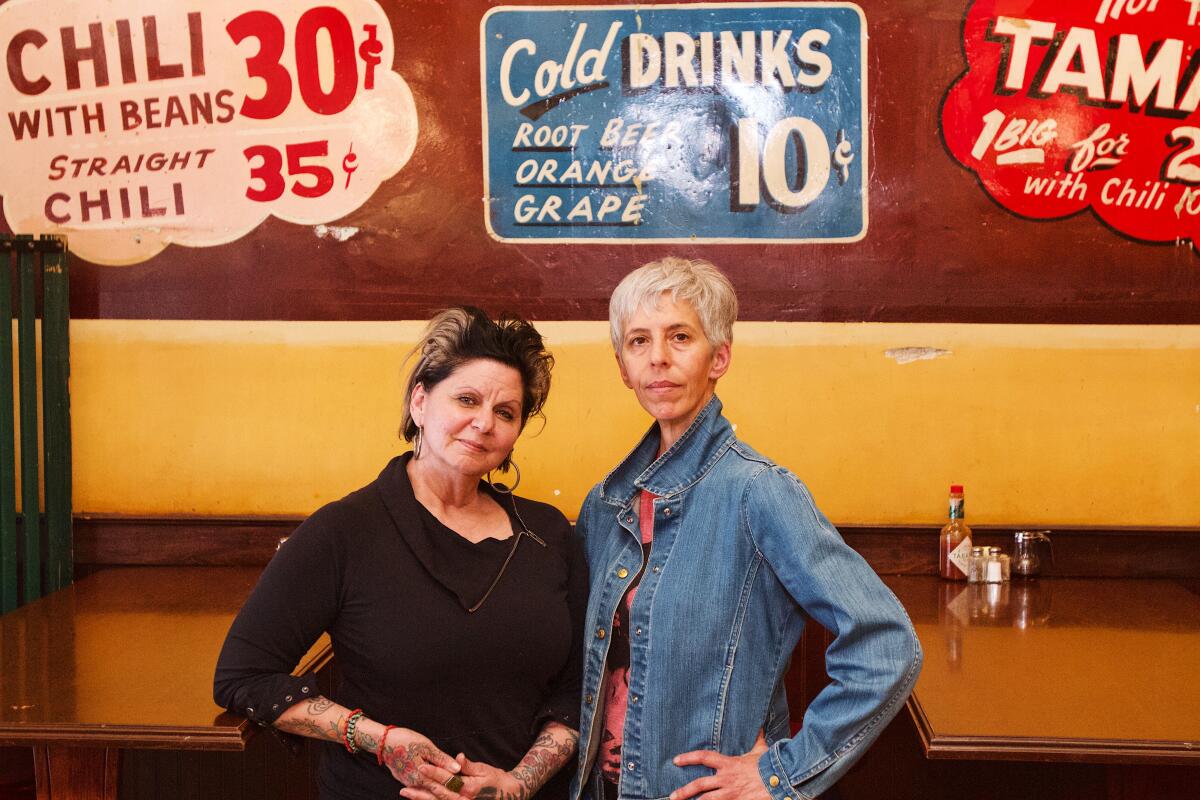
They recall making it through the pandemic’s industry-wide shortage of takeout containers, with restaurants pivoting all at once toward to-go service when indoor dining ceased, and having to buy packaging in back alleys and at an inflated price.
“I thought, ‘We have two choices: Either I raise my prices and nobody comes, or I keep my prices somewhat where they are and everybody comes in, and we just go until we run out of money,’ and that’s sort of where we are,” Trattner said.
The pandemic, they say, changed not only the price of goods but how they see the world.
May and Trattner say they have always tried to feed the surrounding community — especially residents of Skid Row — by providing free and low-priced food to those in need, as well as a more recent Pay It Forward program for guests to buy a meal for a stranger. During the pandemic, they’d been heavily sustained by grants and subsidies to help feed those in need, turning out 300 hot meals per week at a minimum through COVID-spurred programs, many of which no longer exist. The donations from the $12 Pay It Forward program also helped keep the business afloat, though that money was sporadic. Both Trattner and May hoped that they could regain their financial footing as businesses returned to downtown offices, but that never really happened: Weekend business, they say, is still busy, but they can’t offset inflation, loan figures and the future with only weekend sales and without dramatically increasing their menu prices.
They also wonder whether restaurants like Nickel Diner are still sustainable: simple, comforting, nostalgic food amid a crush of flashier, newer concepts: “Everything is sort of out in the open, and it’s a vibe,” said Trattner. “I don’t think that it’s repeatable, and that’s the part that’s extremely sad to me: because it’s like a song that’s ending.”
Both L.A. natives May and Trattner spent decades “running through the streets” in downtown, falling in love with each other in the neighborhood. May owned a wine bar and, hoping to expand her food offerings with a full kitchen, she found a space for a new restaurant — then abandoned — that had decades before served as a Southern-style fried chicken restaurant, a Bigg’s Circus shooting gallery and a Woolworths (a portion of the tile flooring from the old-timey convenience store can still be found near the entrance to the front kitchen). They opened the kind of place that a neighborhood could find comfort in plates of eggs served after 11 a.m.
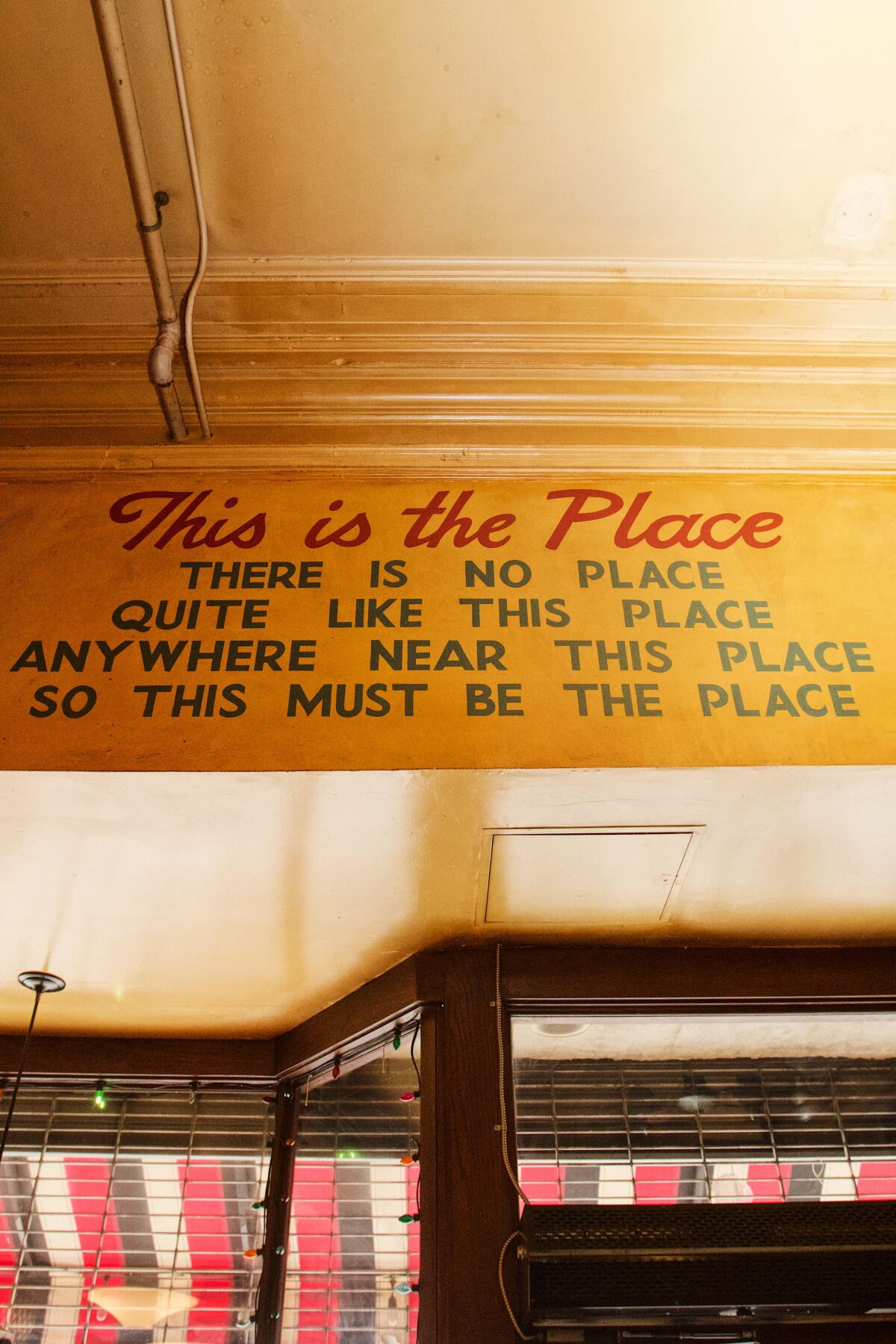
There was plywood paneling and a drop ceiling, and in the year and a half that Trattner and May spent renovating and readying Nickel Diner for its 2008 opening, they unearthed original, hand-painted signage from the 1940s. They took out a range of loans to get the restaurant off the ground, and unearthing the dining’s room’s sign above the door felt like a sign to stop second guessing and to keep going: “This is the place. There is no place quite like this place, anywhere near this place, so this must be the place.”
Their start was rocky. From behind the restaurant’s large front windows they witnessed drug deals in broad daylight, while others sought it inside (a previous restaurant tenant, they said, sold dope to customers who knew to ask for it, and some came in hoping that the item was still on offer). Gradually they made strong ties to the neighborhood, primarily by asking its residents what they’d like to see on the menu — such as peach cobbler and biscuits — and priced them affordably. Now, Trattner says the community on and near Skid Row has been even more disappointed and vocal about their closure than the many customers who’ve left Instagram and other comments.
“It’s hard,” May said. “We know that we’re going to leave this hole, and I worry about the people that we feed: Who’s going to take care of them? Not everybody’s a saint. It’s not easy. There’s a lot of knuckleheads that roll in here and are exhausting, but at the end of the day, we take care of them. And that’s the hardest part: not being able to financially and mentally continue this.”
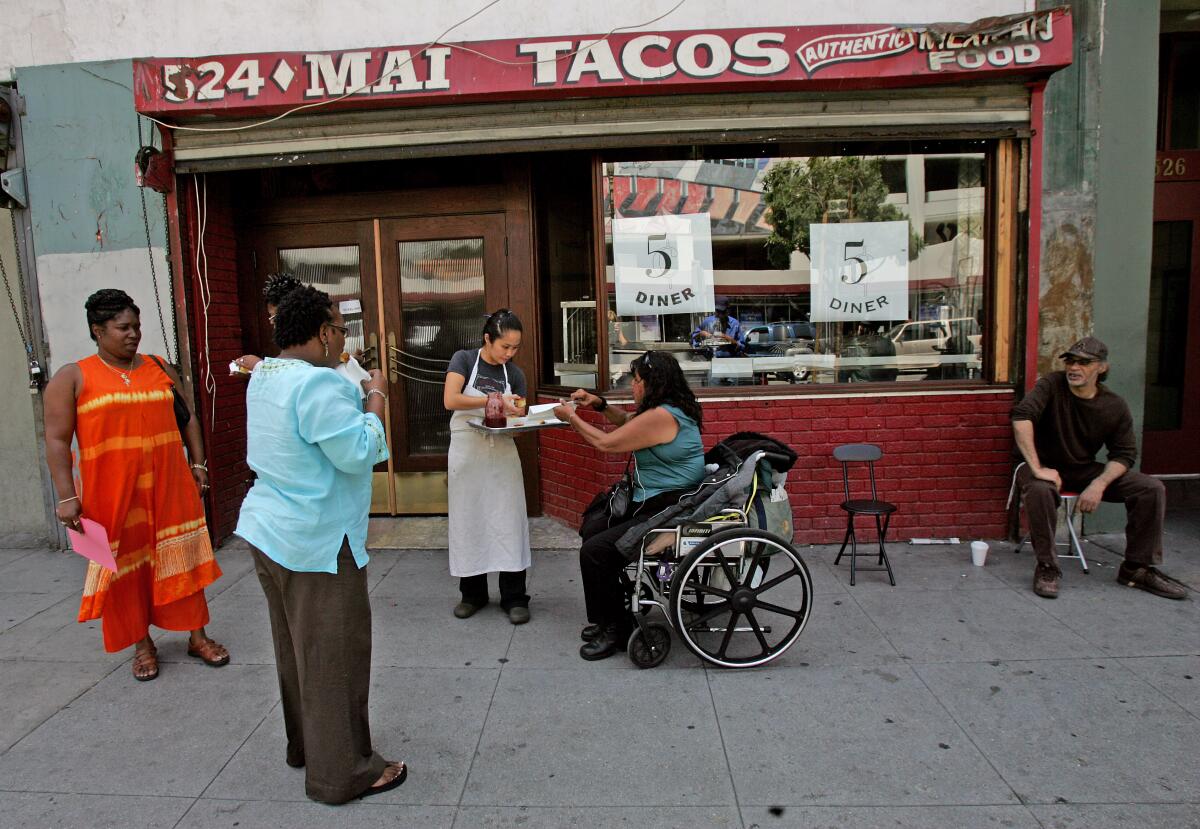
Both May and Trattner, who are keeping the lease on the Nickel Diner space and want to use it as more of a commercial kitchen, hope to continue that ethos by finding partners such as nonprofits or the city to subsidize their efforts. An ideal setup might look like that of Everytable’s, where they build nutritious and affordable meals that they can drop off in nearby buildings and businesses, ideally purchasable for under $10 and with EBT.
They also plan to write a cookbook that interweaves Nickel Diner recipes with stories from the restaurant and of their customers and the neighborhood, and without having to focus on day-to-day operations, they also think new life might spark in the space by hosting pop-ups for other chefs and restaurateurs. They see it as a possibility for setting the table for another, new set of diners — but first, they need some rest.
“We have been in fight or flight for over three years,” Trattner added. “She and I are all adrenaline and instinct, and at some point it all sort of taps off.”
The next few days will be a blur, as every day of business has been since the duo announced their closure on Instagram. Open Thursday to Sunday from 8:30 a.m. to 2 p.m., Trattner and May are selling food in their 1940s time capsule of a space: stacks of pancakes, a transcendent patty melt, the signature maple-and-bacon doughnut featured on Fieri’s “Diners, Drive-Ins and Dives,” fan-favorite fruit-filled pop tarts, the pulled pork hash beloved by Gold, and many other hits, including one item guests can savor in the months following the closure.
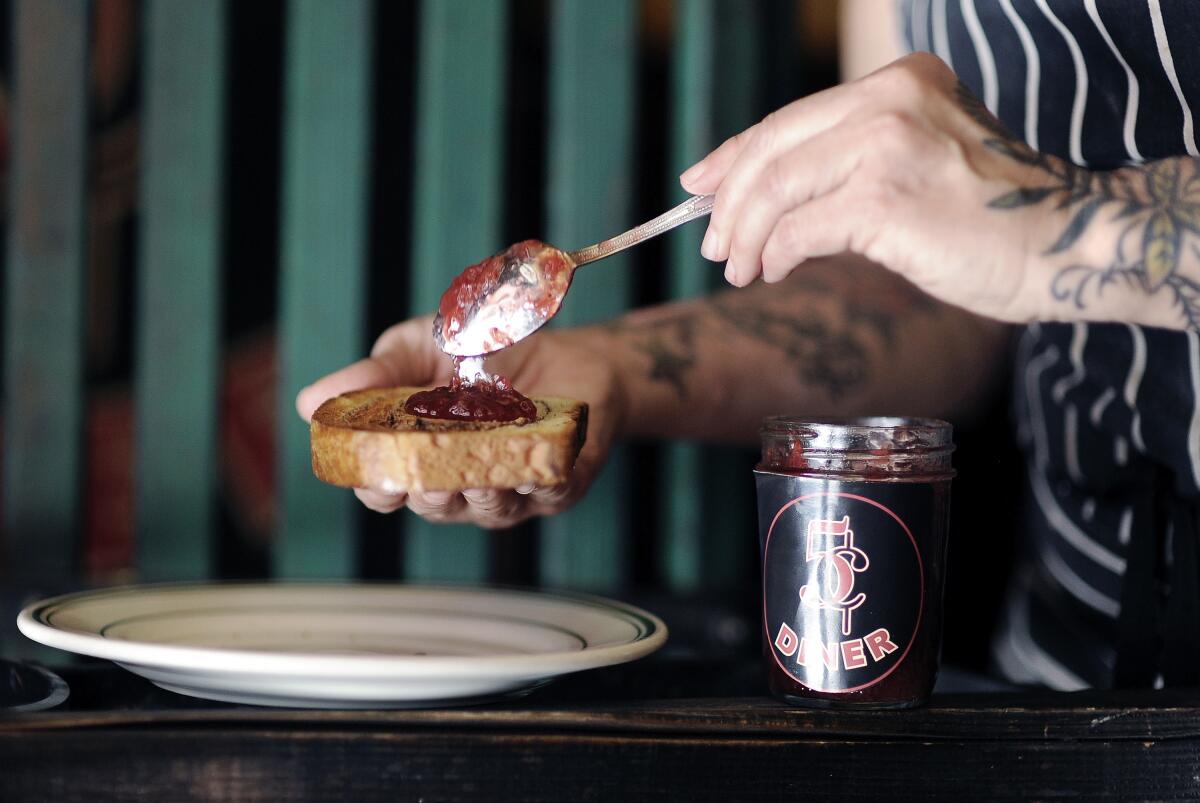
Every week May crafts large batches of her strawberry jam, available for purchase. As a farewell, she’s been producing more than ever to give fans a final taste; ever since they announced the end of their restaurant, they say it’s been nearly impossible to keep those little glass jars in stock (to buy a jar, be sure to arrive early). The support hasn’t only been monetary. Hundreds of comments poured in over social media, both surprising and overwhelming Trattner and May.
“We never anticipated the outpouring of emotions,” Trattner said. “We were tough cookies, and now we’re sort of soggy cookies.”
More to Read
Eat your way across L.A.
Get our weekly Tasting Notes newsletter for reviews, news and more.
You may occasionally receive promotional content from the Los Angeles Times.











